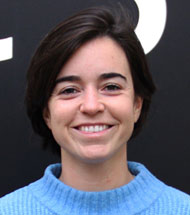"Up to 90% of people in countries on development such as South Sudan and Central African Republic live in unserved areas."
University of Navarra researcher Ángela Abascal warns of the saturation of cities in these countries.

PHOTO: Elena Beltrán
"Up to 90% of people in countries such as South Sudan and Central African Republic live in informal areas with no services". These are the words of Ángela Abascal, architect and researcher at the University of Navarra, on the occasion of a workshop on urban planning in countries at development , which she coordinates at the Navarra Center for International Development (NCID) of the academic center.
At framework on World Urban Planning Day, which is celebrated on November 8, Abascal recalled that the saturation of cities in the most disadvantaged areas of the world is a growing phenomenon "because the population is growing faster than the cities". He mentioned the example of Nairobi, where "75% of the new inhabitants will end up in new irregular settlements".
The expert points to two keys that explain this. The first is that "people migrate from rural areas because they believe that the city is the focus of work and, therefore, guarantees a better life". The second, he says, is conflicts such as Boko Haram, which generate insecurity in rural areas. "There is more protection in the city," he says.
Ángela Abascal points out that these places "grow like foam" and tend to be built near the work offices of those who occupy them, since they tend to walk to them. Many people end up living near industries or wealthy neighborhoods," she adds, "because they often work for high-income families.
approach quantitative and interdisciplinaryThese are some of the challenges that will be addressed at workshop 'Urban issues in developing countries', which will take place on November 9. Three specialists in different disciplines will speak at the event. First, Reinhard König, professor of Computational Architecture at the Bauhaus University of Weimar (Germany), who works on the optimal design of cities through programming tools. Another speaker is Belén Gesto, director of high school for Cooperation in Basic Habitability (ICHaB), who has developed a methodology to prevent future urban settlements. And finally, Primoz Kovacic, engineer and director of Spatial Collective, whose work focuses on the problem of settlements in Nairobi, will speak.
This workshop is promoted by the Navarra Center for International Development (NCID), which is part of the Institute for Culture and Society (ICS) of the University of Navarra. The 2017 Global Go To Think Tank Index Report, prepared by the University of Pennsylvania (USA), includes it in its list of the best think tanks in the world.





